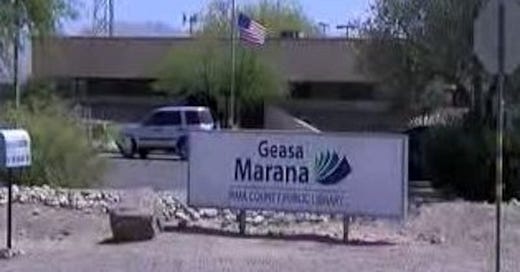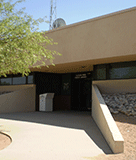Mondays with Morales - 🌵📖 From Cotton Fields to Calculus: How Libraries Change Lives
8/19/24: 🏙️ Vanishing Cultura: The Changing Face of Tucson 🚌 Transportation Troubles: When Libraries Become Unreachable 💡 Imagining a Different Pima County: Books, Culture, and Community

🌵📖 From Cotton Fields to Calculus: How Libraries Change Lives
¡Hola, amigos! It's your boy Maextro Morales here, coming at you with another edition of "Mondays with Morales." Before we dive in, let me remind you that everything I'm about to share comes from my role as a citizen and longtime public government watchdog. I've been keeping an eye on things for over 14 years with Three Sonorans, and all the info I'm discussing is public information that is easily available from the county website.
Now, let's talk about the changes brewing in our Pima County Public Library system. Hold onto your sombreros, because this might ruffle some feathers!
First off, let's look at the numbers. The 2024-25 county budget shows that after all the money collected, including an increased library tax for this year, and after all the expansions and expenses, our library system is still sitting pretty with a surplus of almost $5 million ($4,842,604 to be exact). So, mi gente, why on earth is the county even considering possibly closing multiple branches?
Now, don't panic yet - this is just in the preliminary stages, and nothing's been decided or put before the governing board.
The closure of the Main library? That we can understand. We're talking about a potential $90 million renovation bill, and the place has more issues than a telenovela. One serious problem could shut it down faster than you can say "¡Ay caramba!"
But then we look at the other potential closures from a purely financial perspective. Dewhirst-Catalina, Santa Rosa, and El Pueblo branches? Each would save under $100,000. Amigos, libraries aren't supposed to be profit-making businesses. They're funded by our community, for our community. So why are we making drastic changes to save pocket change when the library system is already $5 million in the black?
Here's where it gets interesting. The library might soon have to pay some serious "child support." The Pima Early Education Program (PEEP) is currently funded by ARPA (the pandemic stimulus package), but in a few years, that gravy train stops. And guess who's picking up the tab? Yep, our library system. We're talking about $10 million a year from the library tax. Suddenly, that $5 million surplus doesn't look so hot, does it?
Now, let's zoom out for a second. Why does it seem like we're getting less as we grow more? Our population is booming, new schools are popping up like cactus flowers after rain, but libraries keep closing. It doesn't add up, compadres.
Let me take you back to my childhood in "Old Marana." Picture it: dirt roads, cotton fields, and not a master-planned community in sight. But you know what we had? A library. Sure, it was small - only 1,000 square feet - but it was our gateway to the world. It gave us free access to every book in the county. It introduced us to MAD magazine and clunky old Commodore 64 computers. For this aspiring author and scholar, it provided math books that paved the way to AP calculus and eventually doctoral studies at Berkeley and the University of Arizona with full-ride fellowships.
We had more when we had less, amigos. Mail came faster, and every school had a library and a librarian. Now, that's just a dream. But it doesn't have to be this way. We've just learned to accept less.
Our leaders seem to be prioritizing a downtown that becomes a playground for college students and a city catering to tourists while our homegrown culture fades away. Where's the Tucson that gave us drive-thru movie theaters, opera houses, the Teatro Carmen, Lalo Guerrero, and Linda Ronstadt? It's disappearing faster than a cold horchata on a hot day.
But there's hope, mi gente. There's enough money to envision a different county. Imagine school books for every student, libraries filled with more books instead of just computers. Imagine... it's easy if you try.
So, enjoy your local public library while you can. The kids in Old Marana can't anymore, and with no public transportation, they're cut off from the world of books that shaped dreamers like me. If I grew up where I did, but in today’s Marana under Mayor Honea, with no bus or car, I would have no access to the nearest library, which literally requires crossing over the Santa Cruz River and the Tucson Mountains over ten miles away!
And speaking of Marana, let me leave you with this thought, amigos. The Marana I grew up in might have been poor in money, but we were rich in other ways. With tens of thousands of new middle-class residents moving in now, making much more dinero than us poor working-class folks did back then, you'd think things would be better. But sometimes I wonder if we weren't richer with the worlds we found in books, books that we discovered in that small Marana library at the turn of the millennium.
So, mi gente, next time you pass by a library, remember what it represents. It's not just a building – it's a portal to other worlds, a launchpad for dreams, and a cornerstone of our community. Let's fight to keep these treasures open for the next generation of dreamers.
Until next time, this is Maextro Morales, reminding you to keep reading, keep dreaming, and keep fighting for the community we deserve. ¡Hasta luego!
Key Takeaways:
💰 Library system has a $4.8 million surplus, yet considers closing branches
🏛️ Main library closure considered due to $90 million renovation costs
👶 Library may need to fund $10 million annually for early education program
📉 Despite population growth, community services like libraries are decreasing
🚗 Lack of public transportation limits library access for some communities
🌎 Libraries provide invaluable resources, especially for underprivileged areas
Last Monday:
✊🏾 Mondays with Morales: Westside Barrios: Uniting Against the Redistricting Storm
Previous reference to Tucson’s continued attempt to break up the Westside Barrios:









I'm sad to hear that libraries are closing. They serve such important functions to communities.